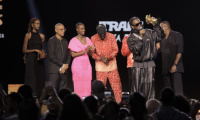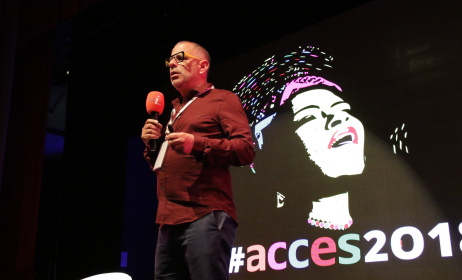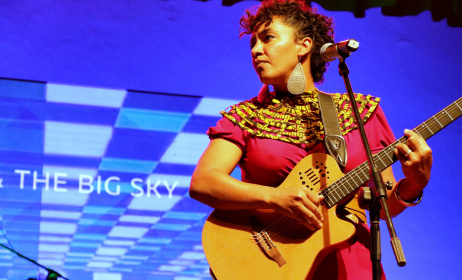Insightful content defines Day 2 of ACCES 2018
It was an insightful Day 2 at the Music In Africa Conference for Collaborations, Exchange and Showcases (ACCES), as delegates were taken through various in-depth discussions. On the final day of the conference, panels and workshops varied from music education, composing for film and accelerating collaborations among African artists.
 Blinky Bill and Mr Eazi spoke about music collaborations.
Blinky Bill and Mr Eazi spoke about music collaborations. Stephan Eicke facilitating a workshop on music composition for film.
Stephan Eicke facilitating a workshop on music composition for film.
It emerged that in Africa music education is not given the time it deserves in mainstream curriculums. A number of African delegates and panellist admitted that in their home countries music is not taught in schools and access to quality music training continues to be a challenge. Held in the main hall of the Kenya National Theatre, the panel was led by Sauti Academy founder Natalie Lukkenaer (Kenya), Zukunftslabor's Annette Rüggeberg (Germany), PASMAE president Ben Kigozi (Uganda), department of music and dance lecturer at Kenyatta University Dr Evelyne Mushira (Kenya), and the director of the Kenya Conservatoire of Music, Wandiri Karimi.
“You get the education that you pay for," Karimi said. "There are many quacks in the business who offer cheap services but don’t teach you anything. Before investing in classes, please do your due diligence."
The need to educate music professionals also featured prominently in the sessions. It emerged that the music ecosystem requires various central skillsets in order to function properly, including instrumentation, sound and lighting engineering and event organisation, all of which require capacity building. With many music schools focusing on classical training, a need to Africanise music education was also highlighted.
Collaborations among pan-African artists have always been viewed as an industry-building strategy, and various ways to accelerate them were discussed at the conference. Panellist noted that collabos were both creative and strategic in nature with both components competing for prominence. Though it is strategic to collaborate with big-name artists, creative synergies are required to make a song successful. There was a healthy debate on the merits and demerits of collaborations and how to navigate them.
“I don’t charge for collaborations with African artists," Nigerian musician Mr Eazi said. "It’s hard to monetise music on the continent so collaborations are for marketing purposes. However, for international artists, where there is money to be made, I do charge vocal services. When I find an emerging artist who is really good, I am always open to work with them. But I have to maintain the quality of my project even if it means investing a little money."
Kenyan radio host Adelle Onyango moderated the panel, which also featured Kenyan producer Blinky Bill. “I have collaborated with people whom I have never met," he said. "Sometimes even a direct DM [direct message] will work. But for me relationships are important. If I can’t hang out with you and connect on a creative level, I won’t do the collabo just because you are famous."
Composing for film continues to be an untapped area with huge potential for the continent's creatives. This specialised area has evaded many African composers. With this in mind, German author and composer Stephan Eicke took participants through the ins and outs of film composition. Better networking between filmmakers and composers was cited as a leading success factor in this space.
“Unfortunately, Americans and Europeans are very ignorant so African music is used as sort of a cliché in gospel-choir, rap or tribal scenes," Eicke, who made references to classic and avant-garde cinema throughout his presentation, said. "If we as a musical society were more open-minded and interacted with each other more often, this would change.”




































Comments
Log in or register to post comments